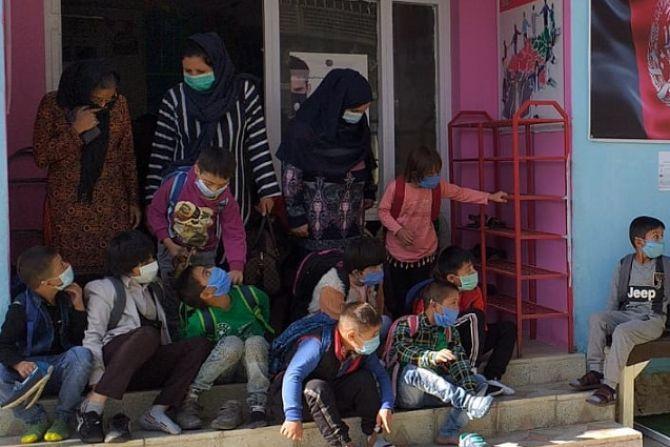Charity run by Catholic nuns asks for prayers for Afghanistan

A group of Catholic nuns in Kabul are safe after the capital city of Afghanistan was taken by the Taliban Aug. 15, the president of a children’s charity said Tuesday.
“We are in constant contact with the sisters present there and we pray for them. I can tell you that they are fine and that all channels have been activated so that they are safe,” Fr. Matteo Sanavio told CNA via email from Rome.
The president of the association For the Children of Kabul asked people to pray “so that all Christians present in Kabul may find salvation and, together with them, the poor and tortured Afghan people will soon be able to have a future of peace.”
Sanavio said he could not give more information about the sisters’ situation at this time due to security concerns.
For the Children of Kabul is an Italian association of priests and religious sisters from different congregations. The association runs a free day center in Kabul for children with mental disabilities, employing Afghan women as staff and teachers.
The sisters also run a scholarship program to help young Afghan women study and provide necessities to nearby families.
Taliban insurgents have taken over many cities in Afghanistan in the past week following the withdrawal of US forces from the country.
With the collapse of Afghanistan’s government, Taliban fighters seized the capital city of Kabul Aug. 15, taking control of the presidential palace and declaring the war in Afghanistan to be over.
Two Jesuit priests from India and four sisters of the Missionaries of Charity are also present in Kabul.
The Christian community is very small in the Islamic country of Afghanistan, where Afghan people can be ostracized or can even face violence and death for professing the Christian faith.
There is a single Catholic Church, located in the Italian embassy in Kabul, which is operated under the Catholic mission sui juris of Afghanistan. In 2018, there were an estimated 200 Catholics in the country, many of them foreigners working in embassies.
St. Pope John Paul II erected the Catholic mission territory in May 2002. Its superior is Italian Fr. Giovanni M. Scalese, a priest of the Barnabite religious order. He has led the Catholic Church in Afghanistan since January 2015.
Scalese, reached by phone on Aug. 17, declined to comment on the current situation due to safety concerns.
Caritas Italiana, a Catholic charity working in Afghanistan, said in a statement over the weekend that the instability of the situation was causing fears to grow “about the possibility of maintaining a presence even in the future, as well as for the safety of the few Afghans of Christian belief.”
The Catholic Sant’Egidio community called on the European community on Tuesday to provide refuge for Afghans attempting to flee the country and to not deport Afghans seeking asylum in Europe back to Afghanistan.
“Europe must act to guarantee the protection of those fleeing Afghanistan reconquered by the Taliban,” the community said in a statement co-signed by the Federation of Evangelical Churches and the representative body of the Waldensian and Methodists in Italy.
“In these hours, thousands of men, women and children risk their lives simply for believing in the values of democracy, freedom to express themselves and to study,” the groups said.
At the end of July, two Catholic sisters of For the Children of Kabul in Afghanistan spoke to the Italian magazine Mondo e Missione. The sisters said they were “very worried about the near future.”
“We live day by day, with serenity,” Sr. Shahnaz Bhatti from Pakistan and Sr. Teresia Crasta from India told the magazine.
“Our families are worried about us: every time they see the image of some attack on TV they fear for our safety,” they added. “But we sleep peacefully, here we have many friends and for the rest we entrust ourselves to God.”
The two sisters, who expected a third sister to arrive in Afghanistan in early August, operate a school for 50 kids ages 6 to 12 with mild intellectual disabilities such as Down syndrome.
Founded in 2004, For the Children of Kabul takes its name from St. Pope John Paul II’s appeal to save the children of Afghanistan during his Christmas Day blessing in 2001.
Sanavio, the association’s president, told CNA Aug. 17 that the day center has faced many closures over the past year due to the COVID-19 pandemic, and had only re-opened “with difficulty” a few weeks ago.
“But now, for security reasons, it has had to close again,” he said. “The children all have their families and are safe.”
The center is located in the Taimani neighborhood in north-western Kabul. Bhatti told Mondo e Missione July 30 that despite the risks, they chose to set up the school there and not in the safer “green zone,” which is close to embassies and government buildings, because they wanted to live “among ordinary people.”
“Here in the house we have a small chapel where we pray daily, while for Mass we have to go to the Italian embassy, usually once a week,” she said, according to the magazine. “Outside, however, we cannot profess the faith, even if everyone knows that we are Christians, they respect us and appreciate the way in which we welcome anyone in need.”
“This is a wounded country, violence is the rule here and life is worth nothing. The blood still flows in the streets as if it were water,” the Catholic sister said. - Catholic News Agency
Radio Veritas Asia (RVA), a media platform of the Catholic Church, aims to share Christ. RVA started in 1969 as a continental Catholic radio station to serve Asian countries in their respective local language, thus earning the tag “the Voice of Asian Christianity.” Responding to the emerging context, RVA embraced media platforms to connect with the global Asian audience via its 21 language websites and various social media platforms.











